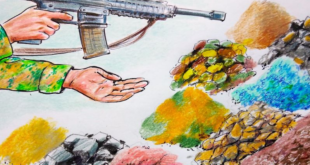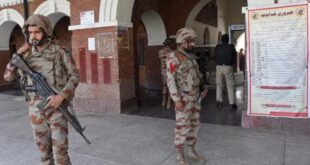In the wake of U.S. and NATO troops withdrawal, foreign missions in Kabul are preparing for evacuation.
Media reports said:
The U.S. Defense Department and the State Department are drawing up plans for the possible evacuation of Afghans whose lives are in danger because of their work for the U.S. government, the U.S. military’s top officer said.
Army Gen. Mark Milley, chairman of the Joint Chiefs of Staff, said it was clear that a “significant” number of Afghans who worked as interpreters or in other roles for the American military or the U.S. Embassy face potential retribution by the Taliban.
“Their safety could be at risk. And we recognize that that’s a very important task, is to ensure that we remain faithful to them and that we do what’s necessary to ensure their protection and, if necessary, get them out of the country if that’s what they want to do,” Milley told reporters aboard his plane after he delivered a commencement address Wednesday at the Air Force Academy in Colorado.
The State Department is overseeing the issue, Milley said in remarks his office released Thursday.
“There are plans being developed very, very rapidly here, not just interpreters but a lot of other people that have worked with the United States,” he said.
It was the first time any senior figure in the administration has confirmed publicly that a possible evacuation was under consideration or that contingency planning for an evacuation was underway.
Milley’s comments were first reported by Defense One.
The State Department did not immediately respond to requests for comment.
In a statement, a spokesperson for the National Security Council said: “I refer you to the Joint Staff to characterize Gen. Milley’s comments. I can tell you we have no plans for evacuations at this time. The State Department is processing SIV applications in Kabul. They are focused on ensuring that the system functions quickly and consistent with U.S. security and other application requirements.”
SIVs are special immigrant visas.
U.S. officials have acknowledged the danger many former Afghan interpreters face, but they have indicated that the administration wants to avoid triggering panic or sending a signal that Washington has lost faith in the Afghan government’s ability to survive.
“We don’t want to signal panic and the departure of all educated Afghans by worst-casing and undermining the morale of the Afghan security forces,” the U.S. special envoy for Afghanistan reconciliation, Zalmay Khalilzad, told lawmakers at a hearing May 18.
“So this is a delicate, complicated balance that we have to keep,” said Khalilzad, who negotiated a U.S. troop withdrawal deal with the Taliban.
Rep. Mike Waltz, R-Fla., a member of the Armed Services Committee who is an outspoken advocate of evacuating Afghan partners, said he was encouraged by Milley’s remarks but appealed for faster action, as U.S. troops would soon be out of the country.
U.S. officials testifying before Congress or answering reporters’ questions have emphasized efforts to expand and speed efforts to provide visas to the roughly 17,000 to 18,000 Afghans who have applied under a program for former employees of the U.S. military or the U.S. Embassy in Kabul. The program has been bogged down in delays, with applicants waiting for years.
A federal court ruled in 2019 that the government had failed to abide by a law requiring it to process applications within nine months, and a State Department inspector general’s report last year described a chronic staffing shortage that had hobbled the program.
Citing assassinations of Afghans associated with the U.S. or other Western governments, a growing number of lawmakers from both parties, as well as veterans and refugee rights groups, are urging the Biden administration to organize an evacuation to a U.S. territory or military base outside Afghanistan, where the visa applicants’ paperwork would be vetted and reviewed.
Asked Thursday about a possible airlift of endangered Afghan partners, Milley said, “That is a way of doing it.”
He added: “I’m not going to discuss how we’re going to do it, because that’ll be in the future. I typically don’t discuss things happening in the future. But we have the capabilities to execute this for those that want to do it.”
As for future U.S. relations with Afghanistan after troops leave by Sept. 11, Milley said the U.S. would maintain an embassy, keep up financial support to the Afghan military and track terrorist threats from afar.
“We want to keep money flowing to the Afghan government security forces,” he said. “We’re going to provide them with assistance from over the horizon, outside of the country. And we want to maintain appropriate levels of surveillance, reconnaissance, early warning indicators of any reconstituting terrorist threat, so we can take appropriate measures if necessary.”
Britain
Britain is preparing to relocate hundreds of Afghan embassy workers and their family members in a bid to avoid a “Saigon moment” scramble to leave as international forces depart.
Endangered local workers at what has been one of the biggest British embassies in the world are being offered relocation to the UK to protect them from possible reprisals if security worsens.
With America accelerating its withdrawal from the country, military officials are now saying that all foreign troops, except a small force guarding embassies and the airport, could be gone by July.
The rapid timetable has left diplomatic missions hurrying to increase security and draw up plans for how to operate in case security plummets, or the Taliban makes quick gains as the international forces leave.
Both the Afghan government and the Taliban have said they will guarantee the safety of diplomatic missions. Yet the rapid pace of withdrawal and the difficulties of maintaining security and transport for diplomats without foreign troops are expected to see some embassies close or dramatically downsize.
The UK Home Office has expanded its scheme giving military interpreters asylum, and is now offering residency to embassy staff who might be at risk, as well as their immediate family.
Simon Diggins, who was defence attaché at the British embassy from 2008 to 2010, said the local embassy staff had been essential to UK efforts, but were considered legitimate targets by the Taliban.
Diplomats and government officials expect the Afghan forces to be able to hold off the Taliban from major cities, with continued international support and funding, and reject parallels with America’s hurried departure from Vietnam.
But they admit circumstances could change quickly, and are trying to avoid a last minute panicked dash for documents. A spate of assassinations of civil servants, journalists and activists in recent months has spread panic among those who have worked with foreigners.
A Government spokesman said the UK owed “a huge debt of gratitude to individuals who risked their lives working alongside UK forces and it is right we provide sanctuary to these brave men and women, and their families.
“To help more people who have supported the British Government in Afghanistan, we are expanding our relocation offer through the Afghan Relocations and Assistance Policy. The UK is also the only country with a permanent expert team based in Kabul to support individuals with security advice, financial assistance and relocation to safe areas.”
Australia
Australia is shutting its embassy in the Afghan capital later this week, citing security concerns ahead of the final withdrawal of U.S. and NATO troops.
Australia announced the temporary closure on Tuesday, and it is to take effect at the end of the week. A number of other embassies in the beleaguered Afghan capital have sent home non-essential personnel, warned their nationals against travelling to Afghanistan and urged those already in the country to consider leaving.
Several embassies contacted by The Associated Press declined to give details of their plans, but many are reported to have scaled back non-essential personnel.
Violent attacks, many of them unclaimed, have targeted journalists and in many cases the country’s minority Shiite Muslims. The U.S. blames those attacks on an upstart Islamic State affiliate.
Embassies in the Afghan capital are located in a so-called Green Zone, considered the most heavily protected. Giant blast walls, barbed wire and steel gates hide the embassies from public view. Streets in the capital have been closed to traffic to protect the buildings.
The Afghan Foreign Ministry said in a statement Tuesday it was committed to providing the embassies with security. But there is a widespread concern about the ability of the government to provide that protection in a city overwhelmed by lawlessness, criminal gangs and insurgent activity.
Australia has 80 soldiers still in the country but at its peak there were 15,000 Australian troops deployed to Afghanistan. Australia’s military has been embroiled in allegations of war crimes in Afghanistan and Australia has established an investigative agency to build criminal cases against special forces suspected of committing crimes from 2005 until 2016.
Obaidullah Baheer, a political analyst in Kabul, was critical of Australia’s decision to close and of other embassies to scale back, saying it undermined faith in the abilities of the Afghan government to provide security.
“Such a move will be seen as a sign of the Australian government’s lack of faith in the republic to defend itself against the Taliban,” he said.
Wave of Afghan Surrenders to the Taliban
Other media reports said:
Since May 1, at least 26 outposts and bases in just four provinces — Laghman, Baghlan, Wardak and Ghazni — have surrendered. With morale diving as U.S. troops leave, and the Taliban seizing on each surrender as a propaganda victory, each collapse feeds the next in the Afghan countryside.
Among the negotiated surrenders were four district centers, which house local governors, police and intelligence chiefs — effectively handing the government facilities to Taliban control and scattering the officials there, at least temporarily.
The Taliban have negotiated Afghan troop surrenders in the past, but never at the scale and pace of the base collapses this month in the four provinces extending east, north and west of Kabul. The tactic has removed hundreds of government forces from the battlefield, secured strategic territory and reaped weapons, ammunition and vehicles for the Taliban — often without firing a shot.
The surrenders are part of a broader Taliban playbook of seizing and holding territory as security force morale plummets with the exit of international troops. Buyoffs of local police and militia. Local cease-fires that allow the Taliban to consolidate gains. A sustained military offensive despite pleas for peace talks and a nationwide cease-fire.
The Talibans take advantage of a defining characteristic of Afghan wars: Fighters and commanders regularly switch sides, cut deals, negotiate surrenders and cultivate village elders for influence with local residents.
The current conflict is really dozens of local wars. These are intimate struggles, where brothers and cousins battle one another and commanders on each side cajole, threaten and negotiate by cellphone.
The negotiated surrenders are part of a broader offensive in which the Taliban have surrounded at least five provincial capitals this spring, according to a Pentagon inspector general report released May 18. The offensive has intensified since the U.S. withdrawal began May 1. The Taliban have used their control of several major highways to cut off bases and garrisons, leaving them vulnerable.
The surrenders have a profound psychological effect.
The series of base collapses represented the second wholesale surrender in a Laghman district in two weeks. On May 7, three outposts and a military base collapsed the same way without a fight, said Nasir Ahmad Himat, the Alingar district governor.
“The soldiers simply dropped their weapons, got in their vehicles and went to the district center or provincial capital,” said Faqirullah, a village elder who goes by one name.
In Ghazni province, Hasan Reza Yousofi, a provincial councilman, said he begged officials to send reinforcements to an outpost and a military base that ultimately fell to the Taliban this month. He played a recorded phone call from a police officer, Abdul Ahmad, who said his ammunition was gone and his men were drinking rainwater because the base water tower had been destroyed by a rocket.
“We have been sold out — we make calls for reinforcements, but officials don’t help,” the recorded voice said. “The Taliban sent us tribal elders who said, ‘Surrender, you are sold out, no one will help you.’ ”
Yousofi said he did not know whether Ahmad survived after his outpost fell.
Negotiations have proved remarkably fruitful for the Taliban in Baghlan province, where at least 100 soldiers surrendered, and in Wardak province, where about 130 security force members surrendered following negotiations, officials said.
In Laghman province, negotiations leading to the surrender of the seven outposts stretched over 10 days. Khadim, the village elder, said different elders negotiated with commanders of each outpost.
A few miles away, Zindani refused to surrender his forlorn outpost near the front line. He said officers who had negotiated surrenders at three nearby outposts had betrayed their country.
One of his men, Muhammad Agha Bambard, said he would fight to avenge the deaths of two brothers he said were killed by the Taliban. He would never surrender, he said.
Zindani’s nine men were down to a machine gun, a rocket-propelled grenade launcher and one AK-47 rifle each inside a ramshackle outpost with bloodstained walls. But he said he intended to fight on — as he told the Taliban commander who regularly phoned to demand his surrender.
“I told him, ‘I’m a soldier of my country,’ ” the commander said. “I am not here to surrender.”
Four days later, on Sunday, the outpost was overrun during a firefight with the Taliban, a member of the provincial council said. One police officer was shot dead and Zindani and his outgunned men were taken prisoner.
A few hours later, the Taliban released a video showing Bambard being questioned by a Taliban commander as he lay on a mattress, his face and neck bandaged. In a mocking tone, the commander asked why Bambard had posted on his Facebook page that he would not let the enemy capture his outpost while he was alive.
The wounded officer responded, “This is Afghanistan.”
 Eurasia Press & News
Eurasia Press & News




